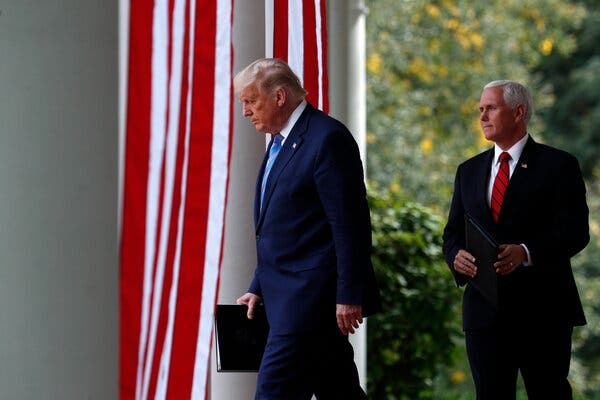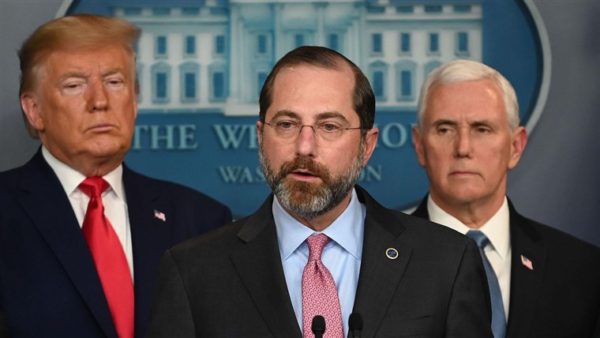Advertisement
A crucial fraction of the millions who watch the first presidential debate on Tuesday will have yet to make up their minds. Here’s what polling tells us about the issues that will come up.

[Watch the presidential debate live and follow along with our real-time analysis.]
In the realm of public opinion, one overarching issue has dominated this year’s presidential race: President Trump himself.
Throughout his term, Americans have expressed strong opinions about him one way or the other, according to polls. And today, most voters know for certain where they stand in the contest between Mr. Trump and Joseph R. Biden Jr. — largely because they’re certain about whether they want to re-elect the president.
In a New York Times/Siena College survey released on Sunday, more than three-quarters of likely voters nationwide called this the most important election of their lifetimes, reflecting the strong feelings on either side.
Still, a crucial fraction of the millions who tune in to the first presidential debate on Tuesday will have yet to make up their minds. Fully 10 percent of likely voters in the Times/Siena poll didn’t express a vote preference, or said they favored a third-party candidate.
Will the president or Mr. Biden be able to peel away enough of those votes to make a meaningful difference in the race?
Chris Wallace, the Fox News host who will moderate the debate on Tuesday, has announced the six topics on which it will be focused: the Supreme Court, the coronavirus outbreak, the integrity of the election, the economy, “race and violence in our cities,” and the respective political records of Mr. Trump and Mr. Biden.
Here’s a look at what polling tells us about where the public stands on those issues — and how the candidates may be looking to score points on each front.
In the wake of Justice Ruth Bader Ginsburg’s recent death, Mr. Trump wasted no time in choosing a successor. He tapped Judge Amy Coney Barrett, an appeals court jurist with a staunchly conservative record — including a history of opposition to the Affordable Care Act.
Polls conducted just before Judge Barrett was announced as the nominee showed that voters preferred the winner of the November election to name Justice Ginsburg’s replacement, following the precedent set four years ago, when Senator Mitch McConnell, the majority leader, refused to hold hearings during an election year on Judge Merrick B. Garland’s nomination.
Fifty-six percent of likely voters said so in the Times/Siena poll, compared with 41 percent who said Mr. Trump should go ahead and fill the seat now. Two NBC News/Marist College surveys in Michigan and Wisconsin released on Sunday also found that a slim majority of likely voters in those swing states thought the winner of the election should be allowed to fill the seat.
But now that Judge Barrett has been nominated, both presidential candidates have made it clear that this debate is about a lot more than Senate precedent. In an interview that aired on Sunday, Mr. Trump declared that with Judge Barrett on the bench, it was “certainly possible” that the court might overturn Roe v. Wade, the landmark 1973 ruling that legalized abortion nationwide.
Such an outcome would go against the will of most Americans, who support keeping abortion legal. In the Times/Siena poll, voters said by more than two to one that they would be less likely to back Mr. Trump if he appointed a justice who would overturn Roe. By 20 percentage points, voters said in a Kaiser Family Foundation poll this month that they trusted Mr. Biden on issues of abortion and family planning more than Mr. Trump.
Meanwhile, Mr. Biden, who himself has a mixed record on abortion rights, has put a much more urgent focus on the Affordable Care Act, a law that has grown increasingly popular during Mr. Trump’s term. Americans now tend to say they support it, according to various polls. In the Times/Siena survey, independent voters alone supported it by more than two to one. And in the Kaiser poll, voters said by a 13-point margin that they preferred Mr. Biden over Mr. Trump to determine the law’s future.
The administration is currently backing a lawsuit before the Supreme Court that seeks to annul the Affordable Care Act, and Mr. Biden has argued that confirming Judge Barrett could mean the end of the law.

In making that argument, Mr. Biden has returned repeatedly to the health threats posed by the coronavirus. “We are still in the midst of the worst global health crisis in a century, a crisis that has already taken over 200,000 lives — between 750 and 1,000 lives a day, and counting,” Mr. Biden said on Sunday. “And yet the Trump administration is asking the Supreme Court right now, as I speak, to eliminate the entire Affordable Care Act.”
Since May, the pandemic has been a weak point politically for Mr. Trump — in part because a majority of Americans have consistently disagreed with his focus on speedily reopening, and because many voters simply don’t feel they can trust him on this life-or-death matter.
By a 15-point margin, respondents to the Times/Siena poll said they disapproved of how he had responded to the virus — including 50 percent of white voters, who generally lean toward supporting the president. According to an NPR/PBS NewsHour/Marist College poll this month, 65 percent of Americans said they tended not to believe the information the president provided on the virus. In poll after poll, voters consistently say by double-digit margins that they think Mr. Biden would do a better job handling the pandemic.
At the debates, look for Mr. Biden to return to the virus as often as he can, hammering the president on what he sees as his greatest vulnerability.
If there is one area in which Mr. Trump retains at least a slight advantage over Mr. Biden, it is the economy. Even as the pandemic has shuttered businesses across the country, putting millions of Americans out of work, a majority of voters have continued to express approval of how Mr. Trump handles economic matters.
By a 12-point margin, respondents to the Times/Siena poll gave him positive marks on that front. In the NPR/PBS/Marist survey, Americans favored Mr. Trump over his opponent by seven points on handling the economy.



